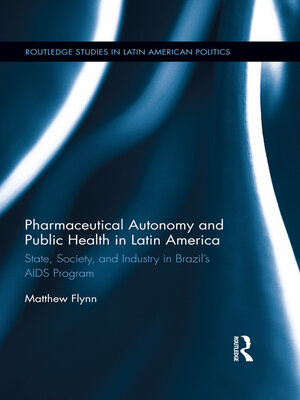Pharmaceutical Autonomy and Public Health in Latin America
ebook ∣ State, Society and Industry in Brazil's AIDS Program · Routledge Studies in Latin American Politics
By Matthew B. Flynn

Sign up to save your library
With an OverDrive account, you can save your favorite libraries for at-a-glance information about availability. Find out more about OverDrive accounts.
Find this title in Libby, the library reading app by OverDrive.



Search for a digital library with this title
Title found at these libraries:
| Library Name | Distance |
|---|---|
| Loading... |
Brazil has occupied a central role in the access to medicines movement, especially with respect to drugs used to treat those with the human immunodeficiency virus (HIV) that causes the acquired immune deficiency syndrome (AIDS). How and why Brazil succeeded in overcoming powerful political and economic interests, both at home and abroad, to roll-out and sustain treatment represents an intellectual puzzle.
In this book, Matthew Flynn traces the numerous challenges Brazil faced in its efforts to provide essential medicines to all of its citizens. Using dependency theory, state theory, and moral underpinnings of markets, Flynn delves deeper into the salient factors contributing to Brazil's successes and weaknesses, including control over technology, creation of political alliances, and instrumental use of normative frameworks and effectively explains the ability of countries to fulfill the prescription drug needs of its population versus the interests and operations of the global pharmaceutical industry
Pharmaceutical Autonomy and Public Health in Latin America is one of the only books to provide an in-depth account of the challenges that a developing country, like Brazil, faces to fulfill public health objectives amidst increasing global economic integration and new international trade agreements. Scholars interested in public health issues, HIV/AIDS, and human rights, but also to social scientists interested in Latin America and international political economy will find this an original and thought provoking read.







